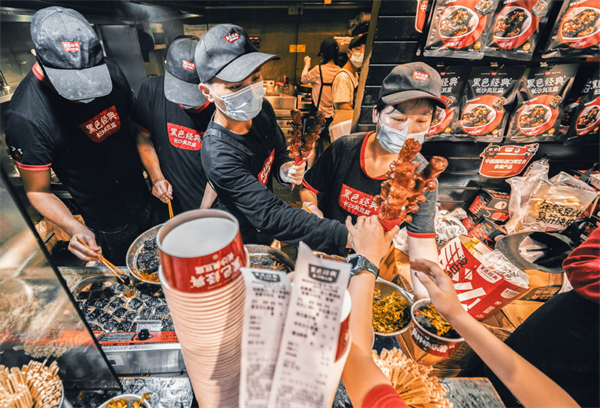
Employees prepare stinky tofu snacks at a Hey Hey Black store in Changsha, Hunan province, in May 2023. [Photo/China Daily]
For most, it smells somewhat odd, yet tastes delicious.
If every city had its own unique dish or snack, the one defining Changsha, capital of Central China's Hunan province, should be its "fragrant" stinky tofu.
The popular offering is made after soybeans undergo various processes such as sifting, soaking, grinding, filtering, boiling and fermenting. Raw bean curd is soaked in brine, emitting a pungent smell that can be a turnoff for the uninitiated.
In fact, frankly put, people either love it or hate it.
Stinky tofu is what has helped the business venture of Lu Lucheng, CEO of Hey Hey Black, transform from a street stall in 2009 into a food chain with more than 1,800 locations nationwide.
Every day, more than 800,000 squares of stinky tofu are sold by the company, making it a representative for local food in Changsha.
The company's sales revenue reached more than 500 million yuan ($69 million) last year, which means it has basically recovered from the COVID-19 pandemic, Lu said.
Changsha stinky tofu dates back to the Qing Dynasty (1644-1911) when a woman began frying discarded tofu in tea oil and stumbled upon a dish that would become a pillar of Hunan's thriving street food culture.
The black tofu cubes with a funky odor possess unique qualities for seasoned local chefs. By examining the color, shape, scent and texture, they select the best bean curds and deep-fry them with oil. This is how a bowl of crispy stinky tofu is made.
There are numerous stinky tofu stores in the city, but what makes Lu's shops special is that his products are poked with holes and filled with broth and local chili sauce, before being garnished with coriander and diced radish.
"We also stick to the traditional way of making stinky tofu and adhere to it to the extreme," he said.
The tofu is super crispy on the surface, just like crackers, and tender on the inside, maintaining the original softness of tofu, he said.
"When you go to the extreme, the iconic Changsha stinky tofu becomes delightful for visitors, who find the dish lives up to its reputation."
At Huangxing South Road pedestrian street, a bustling commercial section of Changsha's Tianxin district, 19-year-old Luo Cuiti bought a bowl of stinky tofu from a Hey Hey Black shop recently.
Tourists holding bowls of stinky tofu were seen everywhere, with many lining up to buy freshly made servings at the company's stores along the street.
The company also owns dozens of stores in Wuyi business center where the street is located, a must-visit for tourists.
Luo traveled to Changsha from Guangdong province and could not wait to try the famous stinky tofu after arriving in the city.
"It tastes very good and spicy, perfect for someone like me who prefers food with a strong taste," she said.
Luo said she had seen posts of the stinky tofu pictures on social media platforms and had been longing to try some for a long time, and it did not let her down.
Liu Rong, a Hunan native, also bought the stinky tofu from Hey Hey Black, which she said tastes better than other brands she has tried before.
The 32-year-old also bought other prepackaged foods from the store, which she intended to give to her colleagues in Guangzhou, Guangdong.
"Many of my colleagues know about the brand as it has really become very popular, and they have asked me to buy some for them," she said.
The prepackaged food has been a key business for the company, which now accounts for around 60 percent of its sales revenue, Lu said.
The company sells more than 130 types of prepackaged local foods at its stores and it wants to bring Hunan's local food nationwide and even to the whole world, he said.
It conducted much research and product searches across the province to select the most representative food items to be sold in its stores, he said.
The company first started to sell prepackaged foods because just selling stinky tofu, which usually is sold at around 10 yuan a serving, could not cover rent and overhead.
The rent for their first store, which is only 8 square meters along Huangxing South Road, was 6,000 yuan per month, and it could only make 300 to 500 yuan a day, barely covering costs, he said.
There are large numbers of people on the street who want to buy stinky tofu, but it has always been a cheap snack, meaning that even if the chefs work really hard to fry the tofu, sales revenue can not be very high, so it started to sell other local foods at higher prices, Lu said.
Therefore, stinky tofu became the perfect item to attract customers to its stores, which are also filled with other more expensive local prepackaged foods, thus successfully increasing sales volume at its stores, he said.
Meanwhile, another key to the company's success is standardization.
"We want standardized stinky tofu so that customers can taste the same standard product every time they buy our product. We also made efforts to standardize our packaging, store design and the taste of other prepackaged foods," he said.

Crowds throng a Hey Hey Black stinky tofu store on Huangxing South Road in Changsha, Hunan province, in May 2023. [Photo/China Daily]
Looking back to his journey of entrepreneurship which started as a college student start-up, Lu said it is very difficult for college students to start a successful business alone and luckily, he had done so with a team of friends.
He would not recommend college students who do not have clear plans and grit to try entrepreneurship and they need to be fully prepared in resources, connections, intelligence and interpersonal skills.
They should also conduct field research in targeted industries before venturing into a business, and closely follow government policies, he said.
The local government in Changsha has given his business venture subsidies of 80,000 yuan and the local Communist Youth League of China also offered a grant of 60,000 yuan during the early stages of starting the business, which has helped greatly, he said.
Meanwhile, as Changsha wants to build itself into a popular tourist city, it has offered great support to brick-and-mortar consumer-based stores, and has been very supportive of companies that think outside the box in terms of store decor, he said.
Since the early stages of its entrepreneurship, the company has benefited from the popularity of Changsha as it attracts a large number of visitors, Lu said.
"People come to the city to relax and enjoy delicious food, beautiful scenery and a cozy environment. It is one of the most vibrant and relaxing cities in the country. You do not need to prepare much before coming to Changsha for a couple of days and can never be dull in a city that never sleeps.
"The company utilizes livestreaming sessions, e-commerce, online stores and offline sales as its popularity is still limited to Changsha," he said.
It wants to pursue a more stable development this year and a major focus for the company is to enter overseas markets as it has tried all kinds of ways to expand domestic market sales.
"We want to bring Hunan's tofu products and chili sauce to overseas markets. The first target market is Southeast Asia where there is a large population of people with Chinese origins," he said.
"We are still exploring and might come up with a more detailed plan in the next half of this year, but we are certain about venturing into overseas markets."
来源:People's Daily
编辑:田兴雨
 时刻新闻
时刻新闻